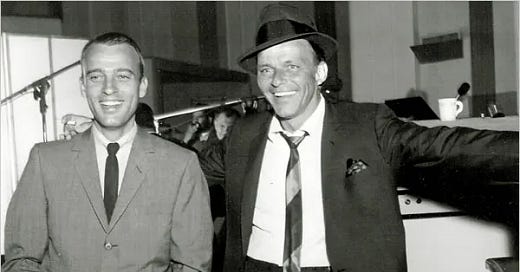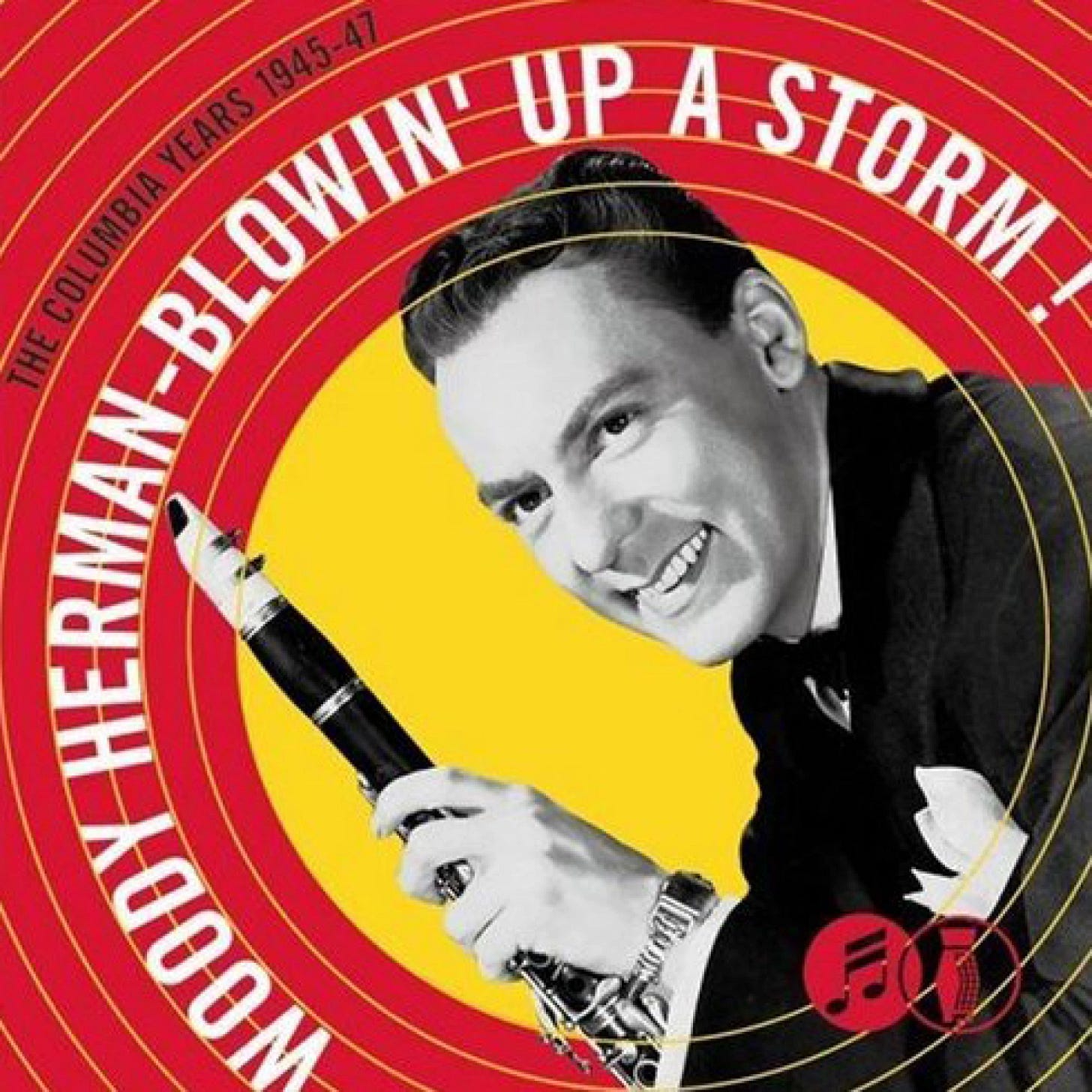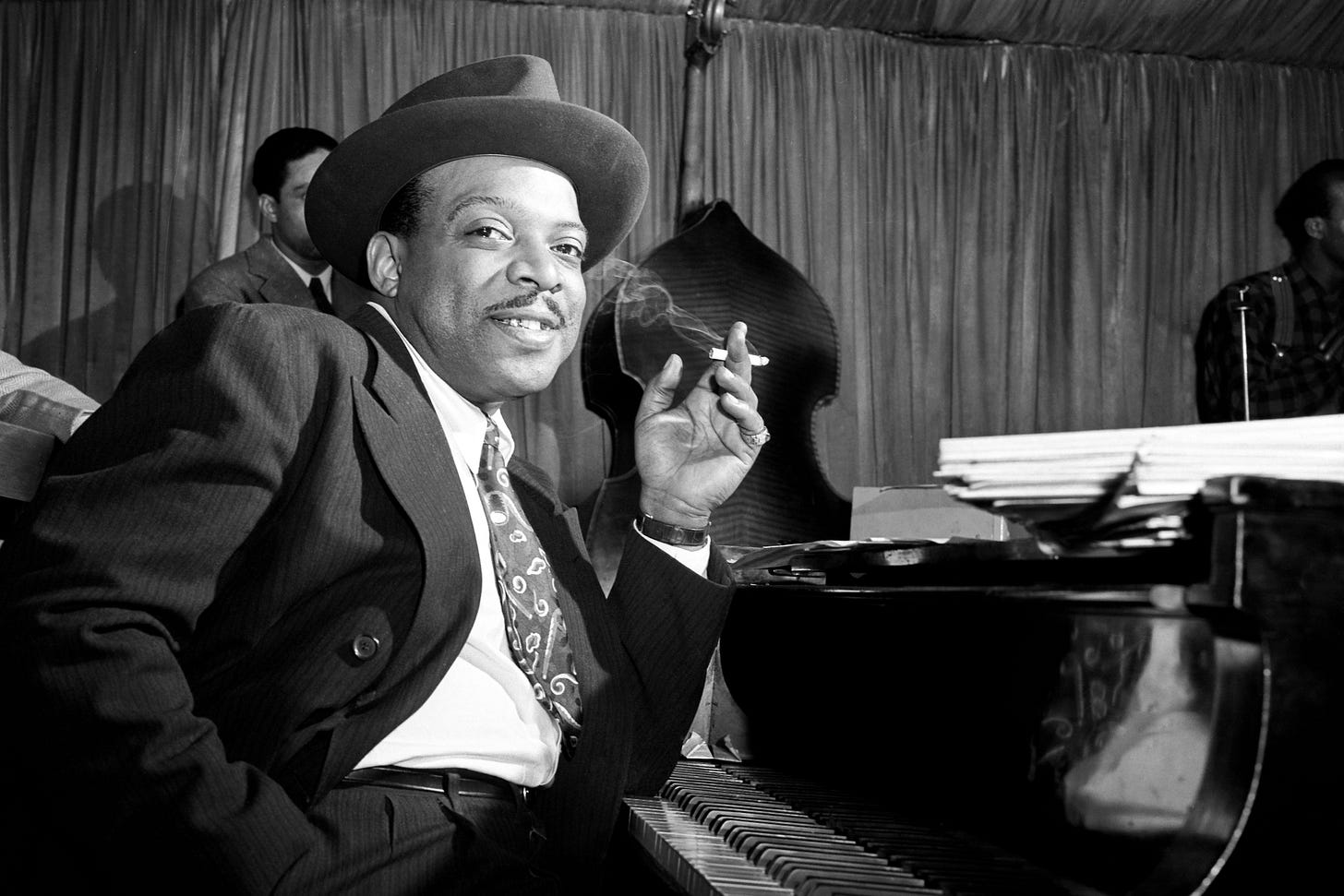That tanned and happy guy hanging out in the studio with an even more tanned, more happy, and vastly more wealthy Frank Sinatra is a big band trumpeter, composer, and arranger named Neal Hefti. There’s a strong chance you’ve never heard of Hefti. But rest assured that, before his death in 2008, he staked a claim to a small piece of your hippocampus, and he’ll probably do the same to the brains of our children, if he hasn’t already.
Such is the power of our theoretically disposable popular culture.
Hefti made his name in 1944 as a trumpeter and arranger for Woody Herman, a big band leader who knew talent when he saw it. Such illustrious sax men as Stan Getz, Serge Chaloff, Zoot Sims, Jimmy Giuffre, and Gene Ammons all played with Herman at one time or another, as did pianist Lou Levy and drummer Shelly Manne.
Hefti was no poser, and he wasn’t dealing with posers. When he arranged a tune, it would be played the way he envisioned it, and he knew how to get the most out of the musicians surrounding him. His arrangements with Herman, like all his best work, gracefully move between late-night tenderness and sharp sonic punch. Years later, Herman’s bassist, Chubby Jackson, recalled Hefti’s approach:
“Neal started to write some of his ensembles with some of the figures that come from that early bebop thing. We were really one of the first bands outside of Dizzy's big band that flavored bebop into the big band—different tonal quality and rhythms, and the drum feeling started changing.”
Herman’s first “Herd” (that’s what he called his bands) was just plain exciting, and Hefti had a lot to do with that. But Herman’s band was just his prelude.
In the early 1950s, Hefti worked closely with Count Basie, whose “New Testament” orchestra—to save money, Basie had been working with smaller groups for a while—swung as ferociously as any big band in jazz history (my late, great friend Benny Powell was one of its trombone players, but that’s for a different post).
Big band jazz simply doesn’t get any better than Basie’s group in the 1950s. Hefti was deeply involved in a great deal of it, including a landmark album called The Atomic Mr. Basie that quite properly features a rolling mushroom cloud on its cover.
If you’re looking for a single big band album from the period that sums up the possibilities of such a unit, this is the one to get. A passionate epistle of swing, it features no less than 11 songs written and arranged by Neal Hefti.
Have a listen.
In 1962, Hefti arranged a collaboration between Sinatra and Basie, after which Sinatra immediately hired him to arrange Sinatra and Swingin’ Brass. You can’t get much bigger than that.
Still, it would take something considerably less complex for Hefti to make a real dent in the national psyche. By the mid-1960s, jazz clubs were starting to dwindle, big bands were out of fashion again, and Hollywood was where the money was stored. So, like a lot of other great jazz men at the time, Hefti turned his attention to writing and arranging for TV and movies.
Not surprisingly, he was pretty good at it. In 1966, he cooked up a tune that would become as recognizable to most Americans as the theme from Mission Impossible or the ticking stopwatch from 60 Minutes.
Neil Hefti wrote “Batman Theme.”
“Batman Theme” has got to be the coolest, most stimulating piece of music ever written to convey the gist of a television series. I don't think anything else even comes close. I’m convinced patients would recover more quickly if this song were piped into hospital rooms after major surgery.
The Who used to play “Batman Theme” on stage in the early days, and the Jam eventually played it because the Who had played it. Far and away the best version, though, was an early one that came courtesy of a group of L.A. session pros who called themselves The Marketts, probably just because they had to call themselves something on the record label.
More than a mere exercise in cartoon machismo, “Batman Theme” is a great rock song, and the Marketts play it as if their lives depend upon it.
Their catchy-as-hell version boasts James Bond, or so it would seem, on electric guitar, a drummer who pounds away like he’s racing “Louie Louie” to the last beer in the cooler, an organist extracting chords straight out of an ungrounded wall socket, and a hyped-up horn section that features a growling baritone sax on the bottom end.
Even the chanted “Batman” refrain drips mid-Sixties pizzazz.
Come on, now. How great is that?
It’s surprising to learn that Hefti struggled with the song and was never completely happy with the end product. The tricky tone of the Batman TV show itself apparently gave him conniption fits.
He outlined his conundrum during an interview in John Burlingame’s 1996 book, TV’s Biggest Hits:
“Batman was not a comedy. This was about unreal people. Batman and Robin were both very, very serious. The bad guys would be chasing them, and they would come to a stop at a red light, you know. They wouldn’t break the law even to save their own lives. So there was a grimness and self-righteousness about all this.”
After working on the song for about a month—and, at one point, almost throwing in the towel—Hefti finally cracked the nut in high style. But that was what he always did.
This guy knew the score, and very often, he actually wrote it.
Before we close, I feel like I have to mention that Hefti wrote another theme song you totally remember, if you’re of a certain age. It was originally composed for the screen adaptation of Neil Simon’s Tony award-winning play, The Odd Couple.
This sarcastic little confection was rather inescapable once The Odd Couple became a hit TV show in the 1970s.
Hefti finally hung it up after he wrote the score for the famous 1976 bomb Won Ton Ton, the Dog That Saved Hollywood, but the only person who saw that one was Won Ton Ton’s owner, and possibly the dog himself, even though a dog isn’t technically a person.
Don’t blame Hefti for the movie’s failure, though. As Jerry Lewis once opined while trying to cut together a poorly shot scene, “You can’t polish a turd.”








Fanfuckingtastic! Chock full of edifying and entertaining content. The description of The Marketts sound is music in itself. Looking forward to the post on Benny Powell (and your others). Thanks.
I hate to disagree with you, but I shall. Batman is way down the list. The Peter Gunn theme has got to be the best ever and I've never even seen the show. Usually I will shun the popular but it won a Grammy! It was such a hit Mancini put it out as an album. Everyone has their own tastes and the industry is more about moolah than music, but the very first album of the year was "The Music From Peter Gunn" beating out Judy Garland and Sinatra. Frankly I'm not sure that Hefti didn't at least subconsciously (and maybe with a little help from bennies) channel a little Peter Gunn while writing Batman. Anyway, glad I got that off my mind. Batman? I would have to put Hawaii 5-0 and maybe even Sanford and Son ahead of Batman.